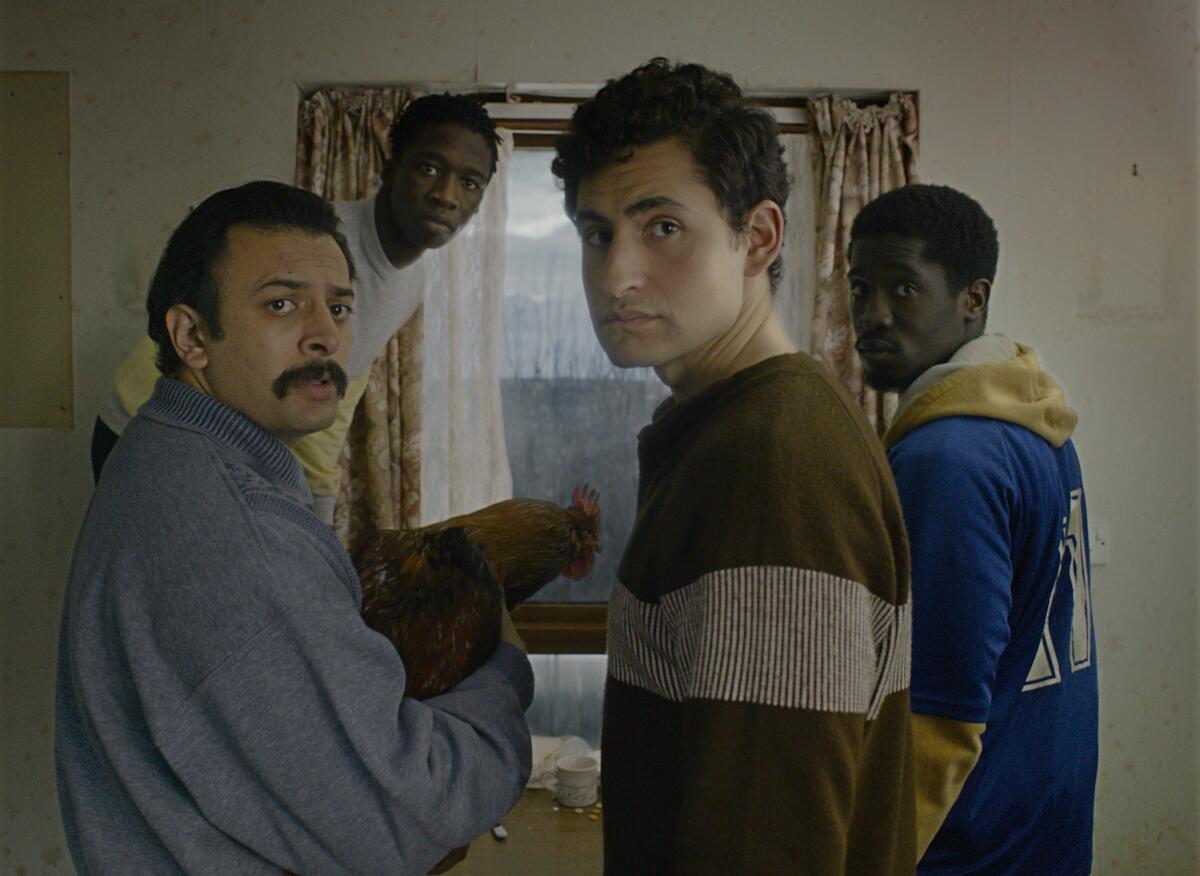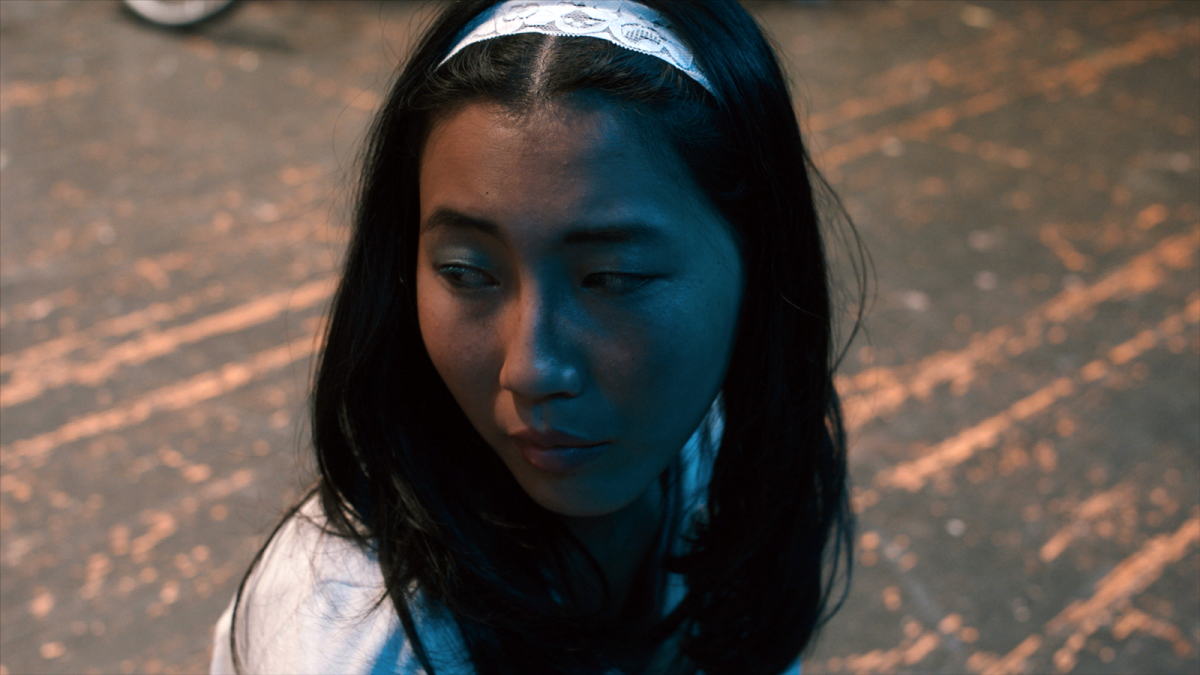Indie Focus: Sad Swedish whimsy in ‘About Endlessness’
Hello! I’m Mark Olsen. Welcome to another edition of your regular field guide to a world of Only Good Movies.
Only good movies
Get the Indie Focus newsletter, Mark Olsen's weekly guide to the world of cinema.
You may occasionally receive promotional content from the Los Angeles Times.
The Oscars were last weekend, wrapping up an extended season that in the end was somehow both very surprising and oddly predictable. Even with that weird ending.
As Justin Chang wrote about Chloé Zhao’s wins for director and best picture, “Nothing about Zhao’s filmmaking — observational smarts, fragmentary narratives, slow-building emotions, microscopic budgets, instinctive regard for the viewer’s intelligence — made her a natural candidate for Oscar glory. That’s why her double triumph Sunday night — she also won best picture as one of ‘Nomadland’s’ producers — is thrilling and no less remarkable for having been widely anticipated all season long. Her achievement is historic many times over.”
Justin also wrote this touching essay about his friendship with Oscar-nominated “Minari” filmmaker Lee Isaac Chung. Although that precluded him from officially reviewing or covering the film, it allowed him to enjoy the film’s success in ways he had never experienced. (And that pun in the movie — “Water you looking for?” That was Justin’s doing.)
One thing the ceremony didn’t do much of is celebrate movie theaters, as Ryan Faughnder wrote about. Aside from a mention in one of Frances McDormand’s acceptance speeches and a PSA featuring Matthew McConaughey, the show largely ignored that key ingredient of movie magic that has been largely missing for over a year now. (I, for one, cannot wait to be safely back in a theater, which now at last seems a not-distant possibility.)
For “The Envelope” podcast, I was joined by Mary McNamara and Glenn Whipp for a recap of the Oscars show, while Yvonne Villarreal sat down with two-time Oscar nominee Cynthia Erivo to talk about her role in the television series “Genius: Aretha.”
Enjoying this newsletter? Consider subscribing to the Los Angeles Times
Your support helps us deliver the news that matters most. Become a subscriber.
‘About Endlessness’
Written and directed by Swedish filmmaker Roy Andersson, “About Endlessness” is another of his absurdist, quizzical reflections on life and its discontents. Andersson has long been a favorite on the festival circuit. and the new film won the directing prize at the 2019 Venice Film Festival. This time out he explores a series of vignettes set around a city, seemingly disconnected but somehow adding up to something more. The film is playing at select Laemmle theaters, on Laemmle virtual cinema and on VOD.
For The Times, Justin Chang wrote, “One of the truths of Andersson’s films is that the people inside them — an unruly swath of everyday humanity trapped, mocked and embraced within his deadpan, diorama-like frames — hold up a mirror of sorts to the audience. … The dreary-looking bedrooms, offices, restaurants and city streets they inhabit, captured in exacting compositions and muted colors (the cinematographer here is Gergely Pálos), constitute a world unlike any reality I know — and could not be mistaken for the world of any other filmmaker. But we can nonetheless see in that world an absurdist reflection, or at least an extension, of our own hapless, frustrating existence.”
For the New York Times, A.O. Scott called Andersson “the great cinematic bard of failure and futility,” before noting, “There is something unmistakably tender about the way Andersson regards his mopey, weary, self-defeating characters, most of whom are as gray and lumpy as the clouds that hover over them. They are the kind company that misery loves, and therefore a source of unexpected consolation.”
For the Washington Post, Ann Hornaday wrote, “It’s an intriguing addition to Andersson’s oeuvre, a carefully constructed — if also painfully self-conscious — box of everyday wonders, whose desaturated, beige-on-beige palette and surface banality conceal a wealth of feeling, an attraction to the numinous and a keen understanding of history and art. … Dreamlike and deliberate, pedestrian and theatrical, bland and strangely beautiful, ‘About Endlessness’ takes in the suffering, struggle and moments of vagrant joy in life and propels them into the cosmos. We’re all earthbound and star stuff in Andersson’s hermetic but quirkily expansive worldview. Which might ultimately be what ‘About Endlessness’ is about.”

‘Limbo’
Written and directed by Ben Sharrock, “Limbo” is set on a remote Scottish island where a group of Syrian refugees are sent to wait out their asylum claims, including Omar (Amir El-Masry), a young musician traveling with his grandfather’s oud. The film is in general release where theaters are open.
For The Times, Carlos Aguilar wrote, “An offbeat and life-affirming triumph, ‘Limbo’ is the kind of original work of art that moves the needle on an issue by interrogating the human factor rather than hanging out on the impersonal surface. A movie born of our times but destined to outlive them, it deserves to cross the threshold from festival darling to audience favorite.”
Emily Zemler spoke to Harrock and El-Masry. The actor spoke of what attracted him to the project, saying, “I was a little tentative to take on anything that has anything touching on the refugee crisis. But with ‘Limbo,’ honestly, I’ve never laughed and cried at the same time from reading a script. It’s so warm and inviting, and it touches on themes about family and identity and loss of identity. Something that anybody can go through at any given time. It just so happens that this man is fleeing his country out of necessity. I loved that he puts Omar into the forefront of the narrative — there isn’t a Westernized character who is showing Omar a better way of living.”
For the New York Times, Glenn Kenny wrote, “Most of the films we’ve seen about the migrant and refugee situation in Europe in recent years are gritty, often heartbreaking dramas and documentaries. ‘Limbo,’ written and directed by a ferociously talented filmmaker, Ben Sharrock, takes an insinuating, poetic and often wryly funny approach. And it’s both heartbreaking and heartlifting.”
For IndieWire, Eric Kohn wrote, “‘Limbo’ doesn’t have fun at Omar’s expense. Sharrock’s charming and insightful second feature justifies its title by using the droll backdrop to explore how the young man comes to terms with his nomadic status. Guided by El-Masry’s tender, understated performance and a tone that hovers between playful and sincere, “Limbo” manages to turn its downbeat scenario into a sweet and touching rumination on the quest to belong in an empty world.”

‘Beast Beast’
Written and directed by Danny Madden and executive produced by Alec Baldwin and Jim Cummings, “Beast Beast” is a portrait of modern youth focused on three teenagers (Shirley Chen, Jose Angeles, Will Madden) navigating the gulf between their virtual personas and bona-fide realities. The film is playing the Laemmle Noho 7 and Laemmle virtual cinema.
For The Times, Robert Abele wrote, “What do we know of anybody from a fragment of life they’ve chosen to record for an imagined posterity? More urgently, what are our wishes for those whose need for fulfillment via attention isn’t always thoughtfully considered? Madden navigates this world of cultivated personality, pressure, alienation and exuberance with admirable sensitivity and stylish zeal, the camerawork and editing an appealing grab bag of naturalistic energy and subjective flashiness. … For all the movie’s soupiness, we’re still left with a handful of memorable characters at a pivotal time in their emotional development, and for that, ‘Beast Beast’ can boast a well-intentioned, caring integrity.”
For Variety, Amy Nicholson wrote, “When the image-conscious trio eventually — finally — intersect, it’s a fluke. ‘Beast Beast’s’ plot twist is a swing at gravitas that disrupts the balance of Madden’s naturalistic character study. This is the way teen life is, Madden says, until suddenly the film accelerates from reality to sensationalism, and trades humanity for pulp. Even in the noir climax, ‘Beast Beast’s’ ideas about validation and integrity are worth a grapple. If only the film’s own self-identity was more grounded.”

Only good movies
Get the Indie Focus newsletter, Mark Olsen's weekly guide to the world of cinema.
You may occasionally receive promotional content from the Los Angeles Times.




